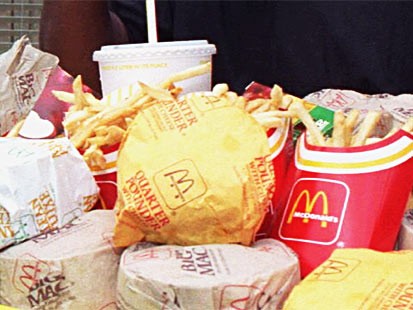
source: SmartCanucks
Taking a closer look at this highly refined food, the author points the fallacy behind it all: "Rather than eating the corn directly, we feed it to our animals, or process it into other foods, losing up to 90 percent of its energy in the process". Which is implied that, the rest of the calories in the food is filled in by processing (read: petroleum).
All this processing has invented brand new "foods" are can no longer be associated with the plants/animal it came from. Does the Chicken McNugget taste like chicken? The answer is no, it tastes like Chicken McNugget. Does the patty in the burger taste like beef? No it doesn't.
The author asserts that if you ask any American were the Chicken McNugget came from, he/she would likely to just say " McDonald's". In some ways, this is a good answer because the McNugget is essentially a completely separate entity from the chicken it supposedly originated from. The modern day day McNugget is nothing more than a Frankenstein of chemicals and proteins lumped together. The history of the food is completely obscured by all the processing. The dedication it takes to traces out the history of any given item on MickeyD's is just as complex as calculating all the corn content of the items out by hand.
At the end of the, the author claims that the industrial diet has become so dependant on corn, that it is fair to say that its eaters are "corn's koala". Another term, I think , can be applied. Since great measures have been made just to use corn in everything, it is reasonable to say that they are also corn-worshipers, as much as the Aztecs once were.
Dispite being America's comfort food, the author implied that we have to look beyond it, and see its true ties with corn.
Using McDonalds as an example of this over-zealousy over corn, the author summarizes his thoughts on the corn-empire: "The farmers going broke cultivating it; the countless other species routed or emiserated by it; the humans eating and drinking it as fast as they can, some of
them—like me and my family—in automobiles engineered to drink it, too"
We eat more and more - and are left not satisfied, but “simply, regrettably, full.”
To conclude this section, I will bring back a question I've been asking myself throughout: "Are we the masters of corn, or is corn the master of us?"

source: midtowngrid
Epilogue: King Corn is a documentary that focuses solely on the this section of the book. The film makers took a similar approach to investigates how corn has taken over the American food industry.
沒有留言:
張貼留言